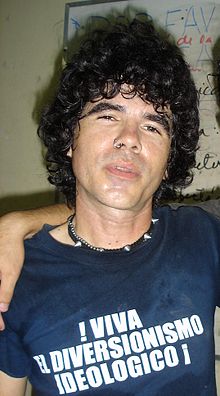This is an old revision of this page, as edited by Czar (talk | contribs) at 02:02, 6 May 2024 (copyvio). The present address (URL) is a permanent link to this revision, which may differ significantly from the current revision.
Revision as of 02:02, 6 May 2024 by Czar (talk | contribs) (copyvio)(diff) ← Previous revision | Latest revision (diff) | Newer revision → (diff) Cuban rock musician (born 1968)
| Gorki Águila | |
|---|---|
 | |
| Born | (1968-11-11) November 11, 1968 (age 56) Havana |
| Occupation | Musician |
Gorki Águila (born November 11, 1968) is a Cuban rock musician and leads the punk rock band Porno para Ricardo. He is known for his opposition to Communism and to Cuba's Castro administration.
Águila lives with his father in a small apartment in Marianao, where he also has been recording his songs with the band since they were forbidden to have concerts. His mother and sister live in Mexico. Águila has an 11-year-old daughter, Gabriela.
 | An editor has launched a copyright investigation involving this section. The text under investigation is currently hidden from public view, but is accessible in the page history. Please do not remove this notice or restore blanked content until the issue is resolved by an administrator, copyright clerk, or volunteer response agent.
The purported copyright violation copies text from http://edition.cnn.com/2008/WORLD/americas/08/26/cuba.singer/ (Copyvios report); as such, this page has been listed on the copyright problems page. Unless the copyright status of the text of this page or section is clarified and determined to be compatible with Misplaced Pages's content license, the problematic text and revisions or the entire page may be deleted one week after the time of its listing (i.e. after 02:02, 13 May 2024 (UTC)). What can I do to resolve the issue?
Steps to list an article at Misplaced Pages:Copyright problems:
|
Initially, his band was well received by the Cuban authorities, being even featured on television, but as his lyrics became bolder, he was banned from performing in public, so the songs were put on the internet with the help of a friend from abroad.
In 2003, Águila was jailed on drug charges after a policewoman posed as a fan and asked him for amphetamines, after which he gave her two pills. He argues this was entrapment and an attempt to silence him. After serving 4 and a half years in Cuba's 5½ Kilo Prison, Aguila became an even more outspoken critic of the Cuban government, his lyrics growing more political. In an interview with CNN in 2007, Aguila said that "Communism is a failure. A total failure. Please. Leftists of the world -- improve your capitalism."
In August 2008, Águila was arrested by the Cuban police with the charge of "dangerousness", which allows them to detain people whom they think they are likely to commit crimes. The charge carries a penalty of one up to four years in prison. Signs of a "dangerousness state" are habitual drunkness and anti-social behaviour. He was eventually ordered to pay a $30 fine for the lesser offence of public disorder, after prosecutors dropped the more serious charge.
He has stated in an interview in 2008: "Capitalism is very problematic, as are Communism and socialism. . . . or me, defending my anti-Castro ideas doesn’t mean an implicit defence of capitalism."
See also
References
- Isla, Wilfredo Cancio (August 27, 2008). "Sigue incomunicado el músico cubano Gorki Aguila". El Nuevo Herald. Real Cities Network and McClatchy Company. Archived from the original on August 30, 2008. Note: disable JavaScript to view the archived page.
{{cite web}}: CS1 maint: postscript (link) - https://www.youtube.com/watch?v=k5xMbHbwW0A CNN - Report on the group on YouTube
- ^ Neill, Morgan (August 26, 2008). "Cuba arrests dissident rocker, band says". CNN. HAVANA, Cuba.
- Voss, Michael (August 27, 2008). "Cuba detains leading punk rocker" [was "Leading Cuban musician arrested"]. Americas. BBC News. Havana. Retrieved October 3, 2023.
- San Pedro, Emilio (August 30, 2008). "Cuba punk rocker spared jail term". World | Americas. BBC News. Retrieved August 30, 2008.
- Chase, Michelle (February 25, 2009). "Socially Dangerous: Misrepresenting Cuba's Punk Rock Trial". North American Congress on Latin America. NEW YORK, NY: MALA Media Accuracy in Latin America (published March–April 2009). Retrieved July 6, 2014.